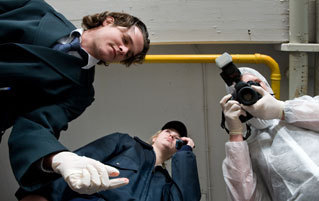The 3 Most Perfect Crimes (and How to Commit Them)

Like a lot of people, I'm constantly licking the edge of a knife, thinking of ways to show them, show everyone.

"They'll regret the day th- owwwwwwwww."
I have of course yet to act on these urges because of my high regard for our system of morals and laws and how often people like me are caught. Sure, I could try to simply not get caught, and ... actually, yeah. Why don't I just not get caught?

"Tastes like a good idea to me."
I'm not the only one to consider this; the so-called perfect crime has fascinated thriller writers for a long time, and they've managed to come up with a number of creative ideas, ranging all the way from stabbing people with icicles to stabbing people ... with ... hmmm. Surely they came up with some other options.

Forensics reports that the entry wound was grapey.
But even in the real world, there have been attempts, including successful ones, at committing the Perfect Crime. And, after conducting some research (and all the taping of thousands of magazine articles onto the walls of my creepy little room that entailed), I'm happy to report to you that there seem to be three broad types of Perfect Crime. I present these to you below, along with some historical examples of their usage, and trust you to use this information responsibly, or at the very least, hilariously.
The Undetected Crime
If there are degrees of perfection, this is the perfectiest of the crimes I'm going to discuss here, a crime so perfect that no one even knows it's a crime. The classic example is a murder that's passed off as a suicide, or perhaps death by natural causes.

"He threw up into his own mouth, so I guess it's suicide by natural causes? Can we check two boxes on this form, or does that mess something up?"
The perfectitude of this type of crime should be obvious. You won't have to deal with any magic CSI-type wizards if the magic CSI-type wizards never even hear about the crime in the first place.

"Ahhh. Yes. A Muggle-wozzler. We're dealing with one sick fuck."
Real-Life Examples:
Well, if any of these actually occurred, we wouldn't know about them, right? I mean, when your Perfect Crime ends up in the newspaper, it loses a couple ticks of perfectness, right?

Still, there must be a few undetected crimes out there, and we can certainly see hints of them by looking at failed examples. Consider Yvonne Gladys Fletcher, an Australian woman convicted in the 1950s of poisoning not one, but two of her husbands with thallium. Thallium is an odorless, tasteless chemical, and when absorbed by the body, it evidently results in symptoms that look a bit like dying from natural causes, making it a popular choice for poisoners (bizarrely so in Australia, which had a brief fad of thallium poisoning in the 1950s).
And more recently, there's the story of Stacey Castor, who murdered her husband (this is a common trend in poisoning cases) while attempting to make it look like a suicide. In this case she did it by feeding him antifreeze with a turkey baster, which you might think is way, way down there on the list of plausible suicide methods, but it turns out that it's even lower than that.

A Hypothetical Example:
So let's say, hypothetically of course, that a man, a good man, pushed too far, happened to have a massive quantity of (2E)-2--N-pentylhydrazinecarboximidamide, otherwise known as a banned drug called tegaserod, which a shady character he found behind the old van factory assured him would cause adverse cardiac effects. And let's say that, hypothetically still, this honest man is tired of all the bullshit that his neighbor, Hypothetical Frank, gives him for spending his time writing comedy on the Internet, instead of, say, being a productive member of society.

Hypothetically, what a dick.
And if Frank, that dick, with his actual job working in or on banks or something, with all the stress and heart problems that such a career entails, happened to have his heart leap out of his chest one day, well then, there'd be no reason at all for the authorities to look too closely into that, would there?

Hypothetically, heh, heh, heh.
The Unsolvable Crime
Taking a step down in perfectishness, we have the crime that, although detected, is committed in such a manner that there won't be enough evidence for the authorities to conclusively solve it. This can also include leaving behind misleading or contradictory evidence, or evidence that is quickly wiped out or covered up. DNA evidence, for example, although a useful thing to gather from a private residence, is often pointless to gather from, say, a bus station.

"Is ... is the floor here washed in blood?"
Real-Life Examples:
A lot of the most famous crimes ever committed qualify as these. The Zodiac killings come immediately to mind, although they're hardly a prototypical example, due to the amount of evidence that was deliberately left behind. A better example might be the product-tampering crimes, like the famous Tylenol-tampering spree in the 1980s, or Japan's vending machine murders from a few years later. In those cases, where the murderers and their victims were never in the same place at the same time and all the evidence was sitting out in a public place for whoever knows how long, there was very little that detectives could do to conclusively solve them.

"Why are you still carrying around that bullet from the last case, detective? What does that have to do with this Tylenol case?"
"I just really like it is all."
A Hypothetical Example:
OK, so let's say, hypothetically again obviously, that our Internet comedy writer goes over to Frank's house with a plate of brownies pumped full of poison, and it turns out that Frank is having a party. And then Frank introduces him to his cardiologist, who is not, as it turns out, caring for Frank's weak heart, but is instead studying Frank's improbably strong and healthy heart. "We hope to learn its secrets, and if possible, end some small measure of human suffering," the doctor happily reports.
"So you're saying that if it suddenly failed, you'd be surprised and, like, do an autopsy of it?"

"Oh my yes. What a queer thing to say."
So, knowing that the Undetectable Crime scenario was right out and that someone would surely detect the poison in Frank's body and then test the food he'd recently eaten, I, I mean, the hypothetical Internet comedy writer, decided he'd have to plant the poison in something other than my, our, his brownies. Instead, by poisoning a foodstuff that many people had access to, and just assuming that Frank had invited many enemies to his party, our hypothetical protagonist knew there would be too many suspects for the police to work out who did it. A perfect Unsolvable Crime.

Hypothetically, this is probably going to end well.
The Loophole Crime
This brings us to the Loophole variety of the Perfect Crime, which is when the crime is detected and the authorities are pretty damned sure they know who did it, but they just can't pin the crime on their perp for some technical reason of the law. This is a big, big trope in movies and television, hinging on most viewers' desperate willingness to believe that the legal system is much stupider than it actually is.

"YEAAAAAH LEGAL LOOPHOLES!"
The film Double Jeopardy is probably the best example of this, in which a woman is falsely convicted of killing her husband and is then told that if she now goes and hunts him down and kills him, she can't be charged again. This is, of course, hot nonsense, as every court in the world would consider this two "murders," of which she'd be innocent of the first one and totally, comprehensively guilty of the second.

"Nice try, though."
Real-Life Examples:
Still, these stories are based on grains of truth, and criminals getting off on loopholes like this do occasionally show up in the real world. Like the man whose DNA was found at the scene of a jewel heist, only the police couldn't use it to secure a conviction because it belonged to a pair of identical twins. Or there's the possible loophole in the Vicinage Clause, which is a provision in the Sixth Amendment of the Constitution stipulating that juries have to be drawn from the legal district within which the crime occurred. This is a problem if the crime occurred in a legal district where nobody lives, like this one weird part of Idaho where, theoretically at least, someone could commit a felony with impunity.

Idaho Is for Murderers
A Hypothetical Example:
So let's say this hypothetical Internet comedy writer is in the washroom, cramming poison into a mini-quiche, when the door opens, and in comes the victim's cardiologist, his learned eyes quickly diagnosing what's happening.

He's not mad. Just disappointed.
"I hope you're about to eat that yourself," he hoped.
"Derrrr," our hypothetical perfect criminal derrred, noticing that his Perfect Crime was becoming decidedly less perfecter. The doctor leaned in to examine the hypothetical bottle of poison that I, uh, someone else was hypothetically holding.
"Because that old slipping-someone-a-laxative prank is illegal," the doctor said. "And dangerous."
"Laxative?" Our hypothetical hero asked.
"Tegaserod is a powerful laxative. A banned one, too; it causes an increased risk of cardiac problems in people with pre-existing conditions. Were you down behind the old van factory recently?"
"Increased risk, like from 0 to 100 percent?" our perfect murderer hypothetically asked.
"If you're healthy, it's probably not that much of a risk at all," the doctor hypothetically responded. "Though I wouldn't eat i-" he stopped, mouth agape, as I hypothetically ate it.
"Thank you, doctor," our hero hypothetically thanked the doctor. "You've provided the perfect solution." Lunging past the doctor's shocked expression, our perfect criminal strode out into the middle of the party and stood there, both legs spread just a little farther apart than normal, a determined expression on his face.
Frank dickishly rushed up a couple of minutes later.

Not even hypothetically this time. Provably, repeatably, confirmed by multiple independent studies, a dick.
"What the hell are you doing?" he dicked. "My doctor just told me you're planning to shit my party? You have to get out of here. Or at least get off the carpet."
"Nope. This is happening, Frank. Although you might live, your precious carpet will not. And best of all? It will all be just an unfortunate accident. The perfect crime!"
Frank hypothetically lunged back, aghast at my levels of criminal mastermindery.

And then a few seconds later aghast at something else entirely.
Anyway, a few days later, he did end up suing me for several thousand dollars' worth of mental stress, carpet cleaning, and mental cleaning, but that was technically a civil action, not a criminal case, which is basically a loophole, or certainly good enough for me. So there you go: The perfect crime isn't a crime at all.
Chris Bucholz is a Cracked columnist and can be found most nights down behind the old van factory. Join him on Facebook or Twitter and beg him to reconsider his life choices.
Always on the go but can't get enough of Cracked? We have an Android app and iOS reader for you to pick from so you never miss another article.
